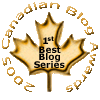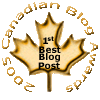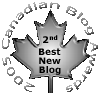Quick point about Dosanjh's potential lawsuit
As many have noted, Dosanjh is publicly musing a lawsuit against Grewal. From where I sit, it looks to be a slam-dunk of a case.
Except for one niggling fact that I noticed several months ago and have not previously mentioned.
Presumably Dosanjh's suit would be based on Grewal's public statements about what transpired from May 16-18 and that Grewal released documents that had been doctored to make it look like Dosanjh had said something that he hadn't.
Grewal's statement, however, was made within the Parliamentary lobby and, as far as I can tell, his interviews with the press were all given from his office. Parliamentary privilege applies. Grewal cannot be sued for defamation for what he said while within parliament.
What about the documents that he released? I'm not a lawyer, but it strikes me that an MP (or, in this case, an ex-MP) could claim Parliamentary privilege for documents (transcripts and recordings) released from his office. In this case, the transcripts and recordings were disseminated through his parliamentary webpage. I wouldn't be a bit surprised if the courts will extend Parliamentary privilege to cover this.
Update In the comments, BCer and Chimera wonder whether Parliamentary privilege applies to speach within Parliament or only within the Chamber. This I'm finding difficult to determine precisely. Note this Speaker's ruling from 1999:
The Speaker: On Monday, November 1, 1999, the hon. member for Québec East raised a question of privilege concerning the breach of his privileges in relation to a civil suit launched against him by a senator who accused him of distributing defamatory material.What does this all mean?
I would like to take this opportunity to thank the hon. member for raising the matter. I also want to acknowledge and thank the Leader of the Government in the House of Commons, the opposition House leader, the Progressive Conservative House leader, the Bloc Quebecois House leader and whip of the Bloc Quebecois for their contributions on this matter. [snip]
Any attempt to intimidate a member with a view to influencing his or her parliamentary conduct is a breach of privilege. Let me reiterate for all members that privilege is a fundamental principle of parliamentary law.[snip]
The position put forward by the hon. member for Québec East suggests that the senator has made an explicit effort to intimidate him by limiting his freedom of speech.
Joseph Maingot clearly states on page 315 of his book Parliamentary Privilege in Canada, and I quote:It may be pointed out that in regard to this privilege, a Member's privilege of freedom of speech concerns speaking in the House or Assembly or in a committee. In addition, the Member is also protected when carrying out those duties, as a Member of the House, that have a nexus with a parliamentary proceeding. However, when the Member performs such duties to his constituents and his party the fulfilment of which do not involve a parliamentary proceeding, the Member is not so protected.I believe that my predecessor, Speaker Fraser, stated matters succinctly on June 10, 1993:What a Member says outside the House about anyone is subject to the laws of the land relating to libel or slander as it would be for any other Canadian—if indeed the comments are actionable. What Members say in the Chamber, however, is protected by privilege.Although I view the types of charges raised by the hon. member with great importance, my role as Speaker is limited to dealing strictly with breaches of privilege that occur during proceedings in parliament. In the words of Joseph Maingot on page 105 in his book Parliamentary Privilege in Canada:It is necessary for something to be said or done in the transaction of a “proceeding in Parliament” before the Member has Parliamentary immunity.Since the incident referred to concerns information contained in a document distributed by the hon. member to his constituents, it is quite clear that this did not take place during proceedings in parliament and is therefore not protected by privilege.
I think that Grewal's speech inside the walls of Parliament are protected, but welcome correction by those who really know. But if the dissemination of the sound files and transcripts is the equivalent of the document distributed above, it might not be protected.
But someone might read this differently and know better than I.




5 Comments:
Actually buckets, unless I'm mistaken, and I'm pretty sure I'm not, privlege only applies to statements made within the House of Commons chamber itself (and maybe committee hearings). Once you step out to the lobby for a media scrum, privlege no longer applies.
Actually, that's exactly what I was going to ask about -- does Privilege not mean that which is said only on the floor of the House?
I can't cite a source, but for years I've heard over and over again that the protection extends only within the chamber. Scrums and press conferences are not parliamentary matters.
wrt to libel, that's a provincial area of law. Ottawa is in Ontario, and libel law in Ontario is quite tough.
There's something called 'qualified priviledge' which can protect politicans as well. First I've heard of it. Here's a link which may or may not be authoritative:
http://www.cyberlibel.com/repman.html
Maybe you're right. It's kind of frustrating that Fraser is cited as saying that one is liable outside the House but what is in the Chamber is protected. What about what's in the House and outside the Chamber?
As I have understood this it is only what one says within the House chambers themselves (Senate as well as Commons) that has absolute protection. Otherwise anything said in a scrum in the halls of Parliament would be equally covered, yet since opposition people rarely repeat their more outrageous allegations they make in QP outside in those scrums it leaves me thinking that such is not protected. As to the website release being covered, on that I genuinely have no clue.
Post a Comment
<< Home